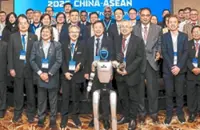42% of office workers say they use generative AI tools (like ChatGPT) at work. — AFP Relaxnews
Artificial intelligence is gradually becoming part of everyday working life, promising productivity gains and a transformation of working methods. Between enthusiasm and caution, companies are trying to harness this revolutionary technology and integrate it into their processes.
But behind the official rhetoric, a very different reality is emerging. Many employees have chosen to take the initiative, adopting these tools discreetly, out of sight of their managers.
A recent survey,* conducted by software company Ivanti, reveals the extent of this under-the-radar adoption of AI. One-third of employees surveyed use AI tools without their managers' knowledge. There are several distinct reasons for this covert strategy.
For 36% of them, it is primarily a matter of gaining a "secret advantage” over their colleagues. Meanwhile, 30% of respondents fear that revealing their dependence on this technology could cost them their jobs. This fear is understandable, considering that 29% of employees are concerned that AI will diminish the value of their skills in the eyes of their employer.
The figures reveal an explosion in clandestine use. Forty-two percent of office workers say they use generative AI tools such as ChatGPT at work (+16 points in one year). Among IT professionals, this proportion reaches an impressive 74% (+8 points). Now, nearly half of office workers use AI tools not provided by their company.
Underestimating the risks
This covert use exposes organizations to considerable risks. Indeed, unauthorized platforms do not always comply with security standards or corporate data protection requirements. From confidential data to business strategies to intellectual property, anything and everything can potentially be fed into AI tools unchecked.
"It is crucial for employers to assume this is happening, regardless of any restrictions, and to assess the use of AI to ensure it complies with their security and governance standards,” emphasizes Brooke Johnson, Chief Legal Counsel at Ivanti.
The survey also reveals a troubling paradox. While 52% of office workers believe that working more efficiently simply means doing more work, many prefer to keep their productivity gains to themselves. This mistrust is accompanied by an AI-fueled impostor syndrome, with 27% of users saying they don't want their abilities to be questioned.
This situation highlights a huge gap between management and employees. Although 44% of professionals surveyed say their company has invested in AI, they simultaneously complain about a lack of training and skills to use these technologies effectively. This disconnect betrays a poorly orchestrated technological transformation.
In the face of this silent revolution, Brooke Johnson advocates a proactive approach: "To mitigate these risks, organizations should implement clear policies and guidelines for the use of AI tools, along with regular training sessions to educate employees on the potential security and ethical implications."
This survey suggests that companies should completely rethink their integration of AI, rather than turning a blind eye to this legion of secret users. The stakes go beyond mere operational optimization: the most successful organizations will need to balance technological use with the enhancement of human potential.
By encouraging open dialogue, employers can foster transparency and collaboration, ensuring that the benefits of AI are harnessed safely and effectively. Ignoring this silent revolution runs the risk of deepening mutual distrust between management and employees, to everyone's detriment. – AFP Relaxnews
*This survey was conducted by Ivanti in February 2025 among more than 6,000 office workers and 1,200 IT and cybersecurity professionals.





